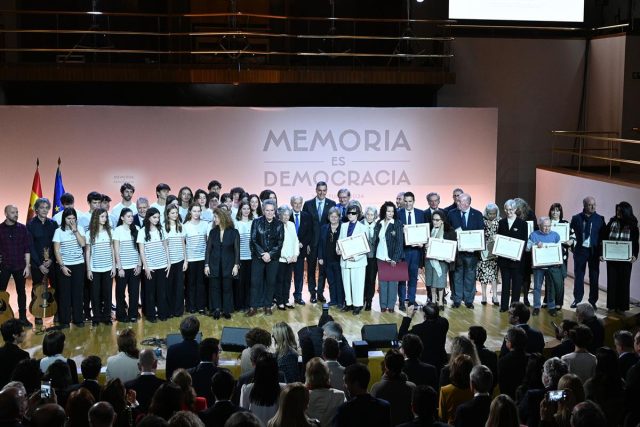
Spanish Prime Minister Pedro Sánchez will begin his political agenda for the new year with a significant event to commemorate the 50th anniversary of the death of dictator Francisco Franco.
This inaugural event will take place on January 8th at the Museo Nacional Centro de Arte Reina Sofía in Madrid and will kick off a series of over one hundred activities planned for 2025 under the theme “España en Libertad” (“Spain in Freedom”). The purpose of this program is to commemorate Spain’s democratic transition and highlight the transformation the country has experienced over the past 50 years of democracy.
The opening event, presided over by Sánchez, will serve as the starting point for a series of acts to be held throughout the year in various locations across Spain. According to sources from Moncloa, the official residence of the Spanish PM, invitations to the event have also been extended to King Felipe VI.
This is an issue of particular importance for the Royal House, as the King’s attendance would likely provoke criticism from many of the monarchists. In this context, Sánchez’s event is part of a broader commemorative agenda that has sparked considerable debate in the Spanish political scene.
The announcement of this commemorative program has elicited a range of reactions from across the political spectrum. Alberto Núñez Feijóo, leader of the opposition and the Popular Party (PP), has expressed his willingness to celebrate the achievements of Spain’s transition to democracy. However, he has rejected what he perceives as an attempt to “divide” Spanish society. Feijóo has argued that the government’s commemoration is aimed at exacerbating political tensions and deepening divisions, rather than focusing on national unity.
On the other hand, Isabel Díaz Ayuso, the President of the Community of Madrid, has strongly criticised the event organised by Sánchez, accusing the government of attempting to provoke unrest through such initiatives.
Ayuso claims that the planned events are a deliberate provocation and a strategy to “burn the streets,” referring to the radical groups that, according to her, tend to emerge during times of government weakness. This controversy occurs in a political environment where historical memory remains a deeply divisive issue in Spain.
In his address in December 2024, Pedro Sánchez defended the need to commemorate the democracy achieved after Franco’s death, which happened 50 years ago.
The president emphasised the importance of remembering the victims of the military coup, the Civil War, and the dictatorship, as well as honouring the individuals who contributed to the democratic transition. According to Sánchez, these acts are designed to strengthen Spanish democracy and reaffirm the values that were established after the end of Francoism.
One of the central pillars of this commemorative program will be the Law of Democratic Memory, which seeks, among other things, to ensure recognition for the victims of Francoism.
Sánchez has stressed the need to impose limits on regional laws that do not comply with this framework, especially those that, in his view, “equate victims and perpetrators.” This stance has been strongly criticized by parties like the PP and Vox, who accuse the government of using historical memory for political gain and promoting a polarized view of Spain’s history.
Sánchez has warned about the persistence of pro-Franco slogans still heard in Congress, suggesting that this underscores the need to continue advancing the consolidation of democracy. In his view, these commemorative events offer an opportunity to strengthen democratic values and ensure that Spain remains committed to the principles of liberty and justice.
The government hopes that these events will contribute to reinforcing unity and democratic values, although it is unclear whether they will achieve this goal given the current political polarisation.



 Subscribe
Subscribe